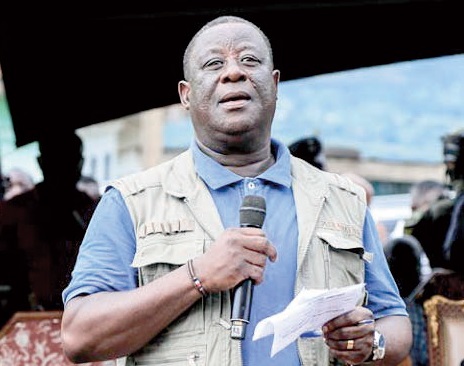Kwasi Amoako-Atta
A term loan facility agreement between the Government of Ghana and Deutsche Bank AG, Frankfurt branch, and TMF Global Services (UK) Limited for an amount of €147,505,734 to finance the reconstruction of the Bechem-Techimantia-Akomadan (40.4km) and the Tarkwa-Agona Nkwanta road projects has been approved by Parliament.
It was presented to the House on Wednesday, July 22, 2020 by the Minister of Defence, Dominic Nitiwul, on behalf of the Finance Minister, Ken Ofori-Atta.
The minister said the government, through the Ministry of Roads and Highways, recognizes the importance of good road infrastructure as a critical facilitator for rapid socio-economic development of the country through the improvement of accesses, reduction in travel times, congestion, vehicle operating costs and accidents.
According to the Finance Committee, the Bechem-Techimantia-Akomadan road runs in the South-North direction from Bechem in the Bono Region through Dwomo and Techimantia, both in the same region to Akomadan in the Ashanti Region.
Its chairman, Dr. Mark Assibey Yeboah, said the road connects the Bono Region to Akomadan in the Ashanti Region joining the main Kumasi Techiman road at Akomadan through mainly agricultural towns and villages.
He indicated that the proposed 40.4km section to be reconstructed is in an advance state of deterioration, and this has led to high vehicle operating costs, dust pollution in the settlements, road accidents and low utilization of the main road in terms of traffic volumes.
“Traffic safety measures such as pedestrian crossings and pavement and road line markings and road signs are absent along the sections,” he added.
Tarkwa-Agona-Nkwanta road
He stated that the Tarkwa-Agona Nkwanta road (66 km) also runs in the South-North direction from Agona Nkwanta to Tarkwa through Bonsa and Nsuta, both of which have rubber and mineral prospects.
“The road forms part of the N1 link between Ghana and neighbours Cote D’Ivoire and other ECOWAS countries. The road also connects to main roads in the seaport of Takoradi.
“These road projects also traverse areas renowned for their production of cassava, rice, corn, tomatoes as well as other cash and food crops for consumption and exports,” he said.
Dr. Assibey noted that due to the bad roads, access to markets for agricultural products and farmers’ access to inputs for enhanced productivity had become impossible.
“Communities along the route are usually cut off from the remaining parts of the country during heavy rains, thereby resulting in persistent outcry by the local population living along these routes,” he indicated.
He pointed out that “the rehabilitation of these roads, if delayed, shall result in the total collapse of a significant part of the regional road network, thereby raising consequent capital cost for rehabilitation and its associated adverse social effects.”
By Ernest Kofi Adu, Parliament House


